- Home
- Cheryl Bolen
One Room at the Inn (The Lords of Eton Book 4) Page 4
One Room at the Inn (The Lords of Eton Book 4) Read online
Page 4
So he understood she hadn’t the money to do so. She hated being the recipient of his charity, hated being indebted to him or to any man, hated that she might be asked to make some sort of “payment.”
She started to say, “I don’t know how I can ever repay you,” but she thought better of it. As a woman who had been married, who had made love to a man, she knew how a man would wish to be repaid.
And she could not bring up such a topic.
The children had finished eating and were restless and bored. Unable to sit still, Eddie raced around the small table where Charlotte and Mr. Fenton were eating, and it took all of Charlotte’s patience not to reprimand him for the rambunctiousness her son was powerless to control.
Susan had no such qualms. “Quit running around. You’re aggravating me!”
Mr. Fenton exchanged an amused gaze with Charlotte, then lowered his voice. “Your children need a diversion.”
“Indeed they do. What do you suggest?”
He drew a breath. “I think the coachman could take them to the mews and give them some lessons on horsemanship. Show them what’s entailed in dressing a horse, what they eat, even how they sleep. The way The White Lion is configured in the shape of a square, they can reach the mews without getting muddied.”
As much as her children—Eddie especially—would adore that, warning bells went off in Charlotte’s head. He wants to get me alone. In the bedchamber. She glared at him. “I can hardly be alone with you here in these private chambers, Mr. Fenton.”
He pursed his lips in thought. “There is that.” He slathered marmalade upon his toast and bit into it. A moment later he rose from the table, crossed the chamber, and locked the door to the bedchamber. He took the key and strode to the children, who had been watching him with quizzing expressions on their tiny faces.
“As man of the family, Eddie,” Mr. Fenton said, “you need to guard over this key to your family’s bedchamber. Can you do so without losing it?”
Susan put hands to her hips, elbows thrust out. “You ought to give it to me, Mr. Fenton. My bwother loses everything. I’ll guard it for him. He can still be the man of the family.”
Eddie nodded solemnly.
“Very well.” Mr. Fenton handed the key to Susan, who placed it in a lacy little reticule she carried over her slender arm.
Next Mr. Fenton rang for a servant, and when a maid came, he asked that she send their driver to these chambers. When that man appeared moments later, Mr. Fenton explained that he was to instruct these children in the care and dressing of horses.
Eddie squealed in delight, and both children happily skipped from the chamber while Mr. Fenton resumed eating his breakfast and freshened his tea.
Now Charlotte’s fears were allayed, and she was beginning to once again feel comfortable in this man’s presence. Not only that, she was happy her children would have something that would greatly amuse them and take their minds off the dreariness of the weather.
“I will own,” she said, “I was at my wit’s end to think of something that would amuse Susan and Eddie. They’re too young for chess or games that might amuse older children.”
“And Susan doesn’t even have Augusta.”
She smiled at him. What a good memory he possessed to remember the name of her daughter’s doll. “A pity. She could have amused herself for many hours had she that ridiculous doll.” She shrugged. “She wasn’t so ridiculous. Her papa gave it to her. I suppose that’s why she was so special.”
He nodded sympathetically. “Of course, even without the sentimental attachment, dolls can be most amusing to little girls. My sister certainly enjoyed playing with hers.”
“You have just the one sister?”
“Oh, one was quite enough. She is most didactic, and since I was the youngest, I was constantly finding myself subjected to her manipulations at every turn.” He shrugged. “Though in spite of her authoritarian ways, my sister is most likeable. Loveable, actually, and I’ll be deuced happy to see that pretty face of hers again.”
“I know you have an older brother, the one with the two children. Were there just the three of you?”
He nodded. “Mama—like my sister—is a delicate beauty, and such delicacy apparently did not aid in breeding. She lost a half a dozen babes.”
Charlotte’s brows lowered sympathetically. “My mother had similar problems. “I was the only daughter, and I had three brothers, two of whom survived to adulthood.”
“And where are your brothers?”
“One is a soldier in the Peninsula. He’s never married. The other is married, lives in remote Yorkshire, and is father to . . .” She rolled her eyes. “Eight. His wife is a most prodigious breeder. And they are only thirty!”
They both smiled.
“Who is it you’re to see in Lincolnshire? Your parents?”
A melancholy look on her face, she shook her head. “No. My parents are dead.”
“How difficult it must be to have lost so many whom you’ve loved.”
It was such an empathetic statement. Most men lacked such sensitivity. Perhaps almost losing his mother had deepened his appreciation of family. She nodded. “But I have been richly compensated with my children.”
“Indeed you have.” There was a wistfulness in his eyes when he gazed at her, swallowing hard.
“One last cup of tea, Mr. Fenton?”
He nodded. “Only because I’m still trying to get warm.”
“Was the Lamb and Staff terribly cold last night?”
“I’m still shivering. It offered the flimsiest fire I’ve ever seen—and that sputtered out in less than two hours. The chamber was so drafty, I got up in the middle of the night to close the window, only to discover it was closed! The counterpane upon the straw bed was no thicker than my shirt. All in all, a most unpleasant night.”
Her eyes twinkled. “Then it’s a very good thing a soldier such as yourself has learned to sleep anywhere.”
An amused expression on his face, he smiled back at her. “Indeed it is. And what about your accommodations, madam? Did you sleep well—in rooms that would have been mine were I traveling all by my lonely, forlorn self?”
“Ah, the price one has to pay for having such charming traveling companions,” she responded flippantly.
“It’s not every day one has the opportunity to travel with another fellow with whom one can share a winkiepiddle.”
They both roared with laughter. She could not remember the last time she had laughed like this. “In all seriousness, as you could have guessed, the children went to sleep right away. I followed not long after and slept very well. It was an exceedingly comfortable chamber, and we are truly indebted to you.” She was careful not to say I am. He was, after all, a man, and she must be careful not to arouse his desires.
But here she was allowing herself to be alone with him, allowing herself to peer into those dark, mesmerizing eyes of his, allowing herself to be . . . enchanted by this man who had been a complete stranger less than four-and-twenty hours ago.
For in spite of her most stringent cautions, she trusted him. God help her if he proved her a fool.
She watched him eat. He appreciated his food with the same enthusiasm as Eddie. In some ways, he reminded her of Eddie—and not just in their obvious admiration of the military. Like Eddie, Mr. Fenton easily integrated with strangers without being wary of them.
She had once been like that. It seemed now like that woman had been another person. As indeed she had been. Would any of the old, carefree Charlotte ever return?
“I’m wondering, Mr. Fenton, how you manage to stay such a cheerful sort when I know that if you served in the Peninsula you must have experienced much loss, must have seen a great deal of death.”
He set down his cup and turned to her, his brows lowering. “You’re right, Mrs. Leeming, but I’ve found life is what one makes of it. If one dwells on melancholy topics, one’s life will be sad. I choose to reach for happiness.”
“I would choose
the same, were I not concerned over how I’m to feed my children.” She could not believe she’d abandoned her pride and made such a confession to him. “You, sir, must never have had to worry about money.”
A pensive look crossed his handsome face. “I will own, madam, that you are right. It has been my good fortune to never have had money woes.”
“I should not have brought up such a topic. Forgive me.”
“There’s nothing to forgive. From the moment I first saw you and the children, I surmised that if you had money, you wouldn’t have been exposing your children to such brutal cold last evening. Then when I discovered you were going to the coaching inn – without a single valise – it became clear to me that you were in serious financial difficulties. It’s my privilege to be able to help you.”
“It’s very embarrassing to me, but at the same time, I feel as if you’re my savior.” What the devil had come over her? She was blathering away like a school girl suffering from a deprivation of pride and want of common sense.
“I’m gratified that I can help. It assuages my conscience. You see, I’m feeling quite low. I promised a comrade of mine who died in battle I would help look after his wife and children, but I was too late to be able to help them. Helping you and Susan and Eddie makes me feel less of a failure, though I still feel beastly about not being able to help them.”
He really was a genuinely likeable man. “When you said you were too late to help your friend’s family, did you mean they . . . died?”
He shook his head. “I don’t think so. At least I hope that’s not the case. I was too late to find them because I believe they . . . moved.”
“Perhaps after you’ve seen your family you’ll be able to return to London and find them.”
“I shall try.” For the first time since she’d met him, a somberness seeped through into his cheerful barrier. He left the table, moved to the fire, and stood there warming himself, eyeing Charlotte. “I appreciate you being candid with me.”
She gave a bitter laugh. “About not being able to feed my children?”
“Yes. I know it wasn’t easy for a proud woman like yourself, a woman of good breeding.”
Her lashes lowered, and she spoke only barely above a whisper. “It was terribly embarrassing.”
“There’s nothing to be embarrassed about. A man has the means to seek employment in order to feed his family. A woman who’s been brought up as a lady does not have an occupation or the means by which to even seek an occupation.”
She nodded. “The only skill I could have offered was that of a governess, but having children prohibits me from doing that.”
“Your year of mourning is up?”
“Yes.” She found that she was getting cold and got up from the table to go stand by the fire beside him.
“Then you’ll remarry. Because you’re pretty, you’ll have not the least difficulty attracting a husband.”
She fixed him with an angry glare. “One doesn’t marry for such mercenary reasons.”
“No, of course not. You must allow yourself to love again.” His voice lowered. “You deserve to love again.”
Then he did a most peculiar thing. An exceedingly unexpected thing. He moved closer to her, clasped two strong hands on her shoulders, and lowered his head to kiss her.
Chapter 5
It wasn’t until she twisted away from him that Philip realized how depraved Mrs. Leeming must think him. He was as disappointed in himself as she must be in him. Grimacing with tightly shut eyes he croaked out a shaky, “Forgive me.”
Her back was to him. All he saw now were the tendrils of blonde hair on her graceful neck, the dainty shoulders hugged by the soft violet muslin of her gown, the forlorn, defeated shake of her head. One moment ago he’d soared with joy as he’d kissed this beautiful woman.
Now he felt like a predator.
“I have no right to ask your forgiveness when I’ve betrayed your trust, but I swear to you I’m a gentleman. I don’t know what came over me.”
Still, there was no response.
“Would it be too much to ask you to try to forget my unpardonable conduct?” he asked. “If you could forget, then we could go on as if it had never occurred, go back to where we were before. I thought we were all getting along jolly well.”
She slowly turned around to face him. God, she was lovely, so much so that she almost stole away his breath. Her cheeks were rosy, he suspected from embarrassment.
“I don’t think I shall be able to forget it,” she said, “but I should very much like to accept your apology with the hope that such an action not be repeated.”
He nodded. “Thank you.”
“Shall I ring for more hot water? Do you not think we need more tea?”
“An excellent idea.”
She crossed the room to ring for a servant.
He was still befuddled over his impetuous action. Even more befuddling, he’d never associated Mrs. Leeming with lust. Not last night when he’d noticed how extraordinarily beautiful she was. Not when he’d thought of wanting to lie in bed with her. Not when he’d told her she needed to love again. Not even when he’d kissed her.
This was not a woman one lusted after. This was a woman one married.
And Lord Philip Fenton had no intentions of marrying.
He supposed he had been too long away from well-brought-up women and loving families. Being around Mrs. Leeming and her delightful children awakened in him all those relationships of which he’d been deprived for the many years he was on the Peninsula.
True, she elicited in him a profound physical craving for intimacy. He wanted to touch this woman. He wanted to hold this woman. He wanted to kiss this woman.
After she ordered the water, she went back to sit at the table. He remained standing at the fire. An awkward silence followed.
“Until yesterday I still wore my husband’s wedding ring.”
“Even though it’s been more than a year?”
She nodded.
“Oh, dear God. You sold the ring yesterday?”
“Yes.”
“I believe it’s what your husband would have wanted.”
“Yes, I think so, too. That’s what I told myself. It would make him happy to know that ring he gave me was continuing to take care of us . . .” Her voice cracked. “After he was gone.”
“Does is not occur to you that selling the ring is the final step in letting go of that marriage? It’s a sign that there will be another happy marriage for you.”
She shook her head somberly. “I never considered there would ever be another marriage.”
“Likely because you were still wearing the ring. I suspect there were many reasons why it was time for you to sell that ring.” He eyed her. “How old are you?”
“Four and twenty.”
He laughed. “Many women are marrying for the first time at so youthful an age. Believe me, a lovely woman like you will be sweeping men off their feet. You’ve got a long, happy, prosperous life to look forward to.”
“Happy is something that no longer seems attainable to me. Especially now.” She glared at him.
And he felt despicable.
The pounding of children’s feet and sounds of youthful voices lifted in merriment moved closer down the corridor until Eddie burst through the doorway.
“Mama! Mama! Mr. Podge permitted me to harness one of our horses.”
“He permitted me to name the horse Smokey,” Susan said, her voice almost as excited as that of her brother.
“But how, my darling,” Charlotte asked Eddie, “did you manage to harness a horse? You’re not nearly tall as they are.”
“He stacked up some very large wooden boxes for Eddie,” Susan answered.
Charlotte brushed away a thick lock of blond hair from her son’s forehead. “However did you know how to do it correctly?”
“Mr. Podge taught me. He said I did it as good as he could.” He looked up at Mr. Fenton for approval.
“I knew you’d
be an apt student.”
“What does apt mean?“
“It means very good,” Mr. Fenton answered.
She might be very vexed with him, but she could not deny he was good with the children. She prayed he wasn’t just being good with them in order to seduce their mother. She had foolishly trusted him last night, but this morning he had destroyed that trust.
In all likelihood Mr. Fenton was a good man. But he was a man, and men had carnal needs. He had demonstrated that this morning.
She watched as he and the children talked about what had transpired in the stables, her thoughts spiraling into a place she hoped she’d never have to go.
For Charlotte Hale had nothing left. Certainly nothing material. She now had come to realize she’d lost her pride. Her respectability would fall next. For if she had to use her body in order to get food, lodgings, and transport to the Duchess of Fordham, she would. That’s what despair does to one.
And for that, she hated Mr. Fenton.
There were few things more trying for children than dreary winter days that kept them indoors. No one understood this better than Philip. As the youngest in his family, he had no doubt driven the others mad with his incessant complaints of boredom. Bless Georgiana. She had always contrived to entertain him with her storytelling or the questioning games she invented to keep him occupied. Perhaps he could now stave off the boredom for the Leeming children as Georgiana had done for him.
“I say, Miss Leeming and Master Eddie,” he began, a mischievous gleam in his eyes, “I am wondering which of you has the best powers of observation.”
Eddie’s lower lip worked into a pout. “I don’t know what obsavation is.”
Susan whirled around to face her brother. “It means to see things, stupid.”
Mrs. Leeming glared at her daughter. She seemed to be doing a lot of glaring today, and it was all his wretched fault. “Do not ever call your brother such a thing. Apologize.”
Now Susan’s lower lip stuck out. “I’m sow-wy I said you were stupid.”

 With His Lady's Assistance (The Regent Mysteries Book 1)
With His Lady's Assistance (The Regent Mysteries Book 1)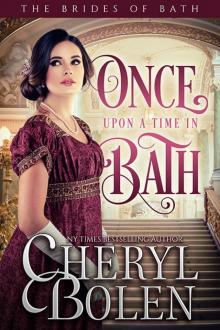 Once Upon a Time in Bath
Once Upon a Time in Bath One Room at the Inn (The Lords of Eton Book 4)
One Room at the Inn (The Lords of Eton Book 4) His Lady Deceived
His Lady Deceived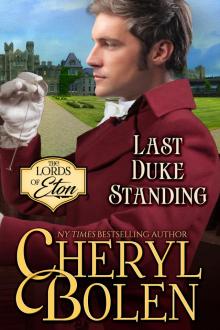 Last Duke Standing
Last Duke Standing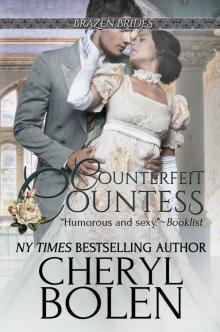 Counterfeit Countess: Brazen Brides, Book 1
Counterfeit Countess: Brazen Brides, Book 1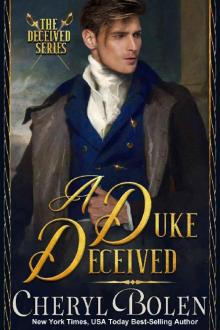 A Duke Deceived (The Deceived Series Book 1)
A Duke Deceived (The Deceived Series Book 1) An Egyptian Affair (The Regent Mysteries Book 4)
An Egyptian Affair (The Regent Mysteries Book 4) Winter Wishes: A Regency Christmas Anthology
Winter Wishes: A Regency Christmas Anthology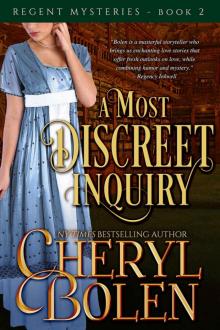 A Most Discreet Inquiry (The Regent Mysteries Book 2)
A Most Discreet Inquiry (The Regent Mysteries Book 2) The Portrait of Lady Wycliff
The Portrait of Lady Wycliff A Lady by Chance (Historical Regency Romance)
A Lady by Chance (Historical Regency Romance) His Lordship's Vow (Regency Romance Short Novel)
His Lordship's Vow (Regency Romance Short Novel) Lady Sophia's Rescue (Traditional Regency Romance)
Lady Sophia's Rescue (Traditional Regency Romance) A Birmingham Family Christmas
A Birmingham Family Christmas Oh What A (Wedding) Night (Brazen Brides #3)
Oh What A (Wedding) Night (Brazen Brides #3) A Christmas In Bath
A Christmas In Bath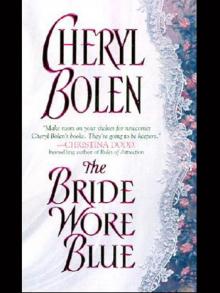 THE BRIDE WORE BLUE
THE BRIDE WORE BLUE Miss Hastings' Excellent London Adventure (Brazen Brides Book 4)
Miss Hastings' Excellent London Adventure (Brazen Brides Book 4)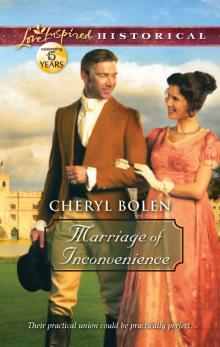 Marriage of Inconvenience
Marriage of Inconvenience Ex-Spinster by Christmas: House of Haverstock, Book 4
Ex-Spinster by Christmas: House of Haverstock, Book 4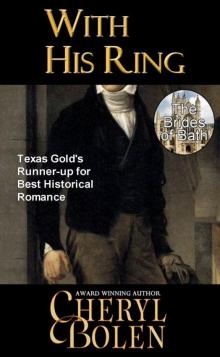 With His Ring (Brides of Bath Book 2)
With His Ring (Brides of Bath Book 2) The Theft Before Christmas (The Regent Mysteries)
The Theft Before Christmas (The Regent Mysteries) The Theft Before Christmas
The Theft Before Christmas To Take This Lord (The Brides of Bath Book 4)
To Take This Lord (The Brides of Bath Book 4)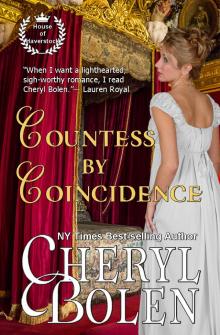 Countess by Coincidence
Countess by Coincidence Captivated by His Kiss: A Limited Edition Boxed Set of Seven Regency Romances
Captivated by His Kiss: A Limited Edition Boxed Set of Seven Regency Romances A Birmingham Family Christmas (Brazen Brides Book 5)
A Birmingham Family Christmas (Brazen Brides Book 5)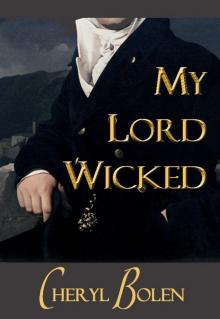 My Lord Wicked (Historical Regency Romance)
My Lord Wicked (Historical Regency Romance) A Duke Deceived
A Duke Deceived The Earl, the Vow, and the Plain Jane
The Earl, the Vow, and the Plain Jane The Bride's Secret
The Bride's Secret The Earl's Bargain (Historical Regency Romance)
The Earl's Bargain (Historical Regency Romance) Rebels, Rakes & Rogues
Rebels, Rakes & Rogues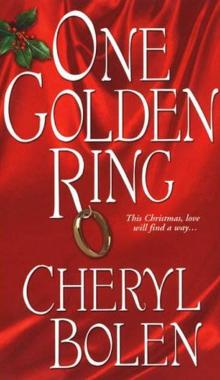 One Golden Ring
One Golden Ring